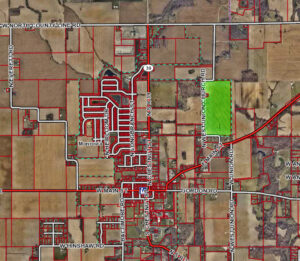
MORGAN COUNTY — A fact everyone has known for months has officially been confirmed: Google is the company behind Project Louie, the data center campus planned to be constructed in Monroe Township, just east of Monrovia.
Representatives from Google identified the company as being behind the project last week, releasing a prepared statement that promised further information in the future.
“We are always planning for future capacity needs, which includes evaluating options to expand our data center presence in markets across the U.S.,” Google Data Center Public Affairs Manager Broderick Green wrote in the statement. “In Indiana, we can confirm we are exploring a potential development in Morgan County, Indiana. We appreciate the collaboration with both Morgan County and state leadership as we evaluate the opportunity together.”
Reports of a data center campus coming to Morgan County emerged last year. Google had previously purchased nearly 391 acres of land just east of Monrovia’s town limits, with the planned buildings to be positioned north of Ind. 42, east of West Union Church Road, south of Keller Hill Road and west of Antioch Road.
The county commissioners would go on to rezone that land for data center use back in February. Earlier this month, the commissioners authorized the rezoning of an additional 158 acres of land to be used for Google’s data center campus.
The public response to news of a data center has largely been opposition. Citizens have voiced anger about the electricity it takes to power a data center, the water it takes to cool the proposed facility, the potential loss of property value as a result of the data center and about the perceived lack of transparency from county officials regarding the project. Many county officials signed non-disclosure agreements with Google in order to learn more about the project.
With Google identifying itself last week, these NDAs have largely been nullified, and so The Correspondent sat down with Mike Dellinger, executive director of the Morgan County Economic Development Corp. (EDC), who has spearheaded the effort to bring a data center to Morgan County.
In a long interview on Monday, Dellinger spoke candidly about the project, defending it from the widespread public opposition and revealing new information about the data center that was not previously made public.
Project origins
Dellinger said that he was first approached by Google about a possible data center campus during the first quarter of 2024, and that talks about pursuing the project began in earnest last summer.
Dellinger said that Google and AES Indiana, the operator of the Eagle Valley powerplant in Martinsville, had been in talks with one another about developing a data center in Morgan County for some time before Dellinger was approached, though he was not able to say how long the two companies had been working together.
Dellinger said that at the same time Google began talks with him about Project Louie, another company had approached him about building a data center in the county. This company, which he would not name on the record, eventually withdrew its plans to pursue a data center campus in the county because AES Indiana allegedly told the company it did not have the capacity to serve both it and Google.
The land this second company would have used had already been rezoned for data center use, and could be used for that purpose in the future, Dellinger said.
Dellinger signed non-disclosure agreements with both companies, which he said is a standard practice so companies can protect confidential information from their competitors in the marketplace.

“It’s just the nature of business,” Dellinger said. “It goes on all the time. I’ve got several NDAs with other companies right now, in fact.”
As talks between Dellinger and Google developed, other people involved in county business, including elected officials, began signing NDAs to learn more about the project. Dellinger himself is not an elected official, as the EDC is a domestic nonprofit corporation. But the EDC does receive public money from Morgan County, Mooresville and Martinsville, and locally elected officials serve on its board.
Much more recently Google purchased a 79.16-acre farm within Monrovia’s town limits back in early September for $100,000 per acre and a total cost of $7.9 million. The farm is adjacent to the acreage outside the town limits that the county has zoned for data center use, and the addition brings Google’s current land total to 628 acres at present.
With the farm being in Monrovia’s town limits, the town government has jurisdiction over how the land is zoned. The land is not currently zoned for data center use, but Google’s purchase makes it clear that the company intends to fold the land into existing plans for the data center campus.
Future information
Dellinger promised that even more information would be made known in the coming weeks and months, including the names of the nonprofit organizations that will receive money from Google as part of the company’s agreement with the county to offer payment in lieu of taxes.
Dellinger would not say on the record which nonprofits would receive funding, but he said at least five in the county had been identified, including three in Martinsville alone. Additionally, each of the county’s four public school districts will receive compensation of some kind from Google.
Beyond this, Dellinger spoke at length in defense of the data center, arguing that it will be a massive financial boon for the county.
“Day one, this thing starts paying property taxes,” Dellinger said.
Former county administrator Josh Messmer previously told The Correspondent that the county anticipates receiving approximately $750,000 in tax revenue from the data center in its first year, as well as an additional $250,000 that will go to individual local entities like school districts. More tax dollars are expected as construction takes place and buildings are erected.

This tax revenue comes after both state and local tax reductions. At the end of May, the Morgan County Council approved a resolution granting Google real property tax deductions of 50 percent for the next 10 years.
Additionally, the Indiana Economic Development Corp. approved a 35-year sales tax exemption on the purchase or lease of computers, servers or other equipment data centers need to run their facilities. Data center operators will also be exempt from having to pay utility taxes on the purchase of electricity needed to run the equipment.
After the 35 years is up, Google will have the opportunity to renew the incentive for up to three additional five-year periods, meaning Morgan County’s data center may enjoy state tax breaks for the next 50 years.
Nevertheless, Dellinger said, the county will still bring in a million dollars from the data center in its first year, and will bring in even more after the county’s abatements expire after 10 years.
“The data center will bring us stability for the future,” Dellinger said.
Said stability, Dellinger claimed, would offset the revenue lost as a result of Senate Bill 1’s property tax cuts approved by the Indiana General Assembly earlier this year.
Above all, Dellinger touted Google as “very philanthropic,” and pushed back against concerns from local activists about energy use, calling Google “environmentally conscious.”
“The company is not gonna be draining anybody’s wells,” Dellinger said. “The last thing they want is for their neighbors to be upset.”
Towards the end of the conversation, Dellinger reflected on what he said several elected officials had apparently said to him in regard to the data center. He said each one of them knew the risk they were taking politically by supporting the project, but thought the money it would bring in would be worth it.
“They said, ‘This could end up getting us unelected,’” Dellinger said. “But that’s the risk they were willing to take.”








